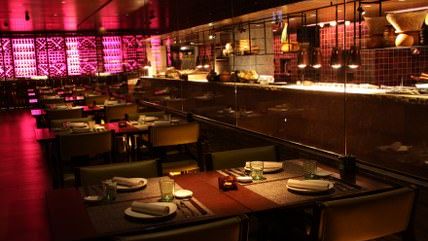Underground Restaurants Are Cool—And Driven by Insane Fees and Regulations


Yesterday, Scott Shackford wrote about the phenomenon of underground dinner parties which charge a fee for admittance—they're basically unlicensed restaurants. Mainstream journalists being what they are, which is to say, capable of sounding like they're just visiting from a world entirely unlike our own, New York City's CBS affiliate reported on the phenomenon with breathless alarm, troubled that such popular experiences take place beyond the long reach of regulators and others control freaks. But as it turns out, that's one of the attractions, for both customers seeking a thrill, and proprietors who find licensing and permitting requirements crippling and unaffordable.
As CBS put it:
When asked if the underground restaurants should be regulated, Lubarsky told [CBS 2 investigative reporter Tamara Leitner] Leitner, "Yes, they should be regulated by the same system that regulates every restaurant in New York City."
The Health Department refused to discuss the issue on camera but in a statement told CBS 2: "In New York City, people who offer meals to the public for money are considered food service establishments and need permits. The city does not allow meals to be served to members of the public in someone's home."
But underground restaurants have been a "thing" for years. They started largely out of necessity because aspiring restaurateurs just couldn't navigate or afford the unbelievably burdensome process of opening restaurants legally. Not surprisingly, underground restaurants are a big deal in lower-income ethnic communities where coughing up outrageous sums to open a low-margin eatery is challenging at best. But they've also become mainstream in areas where regulations are heavy and pricey.
Reporting on the growing phenomenon in California in 2005, Ella Lawrence in San Jose's MetroActive quoted underground restaurateurs on exactly that point.
"It costs $200,000 just for a permit to be allowed to buy water from the city!" exclaims Hale. "You have to get tons of permits from various people. You've got to get a building permit, a permit if you want to remodel, you have to get licenses for beer and wine, and you have to get certified by the Health Board."
Hale was operating in Healdsburg, a small town north of San Francisco.
So underground restaurants came from necessity, but as creative aspiring chefs do their best to make the black market operations attractive, they've acquired a patina of cool.
As part of their forecast of restaurant trends for 2009 (PDF), Joseph Baum and Michael Whiteman, the restaurant consultants behind Windows on the World, predicted that black-market establishments would thrive, at least partially because of diners' desire to "stick it to the man" by "patronizing entrepreneurs who have no health department license, pay no taxes, insurance or social security…"
How New York City's restaurant regulations compare to those of Healdsburg, I don't know (though New York Enterprise Report does comment, "the terrorists have infiltrated our city and are employed at the department of health"). But I do know that the city's regulatory apparatus is so complex that people often hire "expediters" to make sure all requirements are met—and the right palms are greased (PDF). The system is widely considered too difficult for people to navigate on their own.
No wonder aspiring restaurateurs would rather run underground businesses than "legitimate" operations.


Show Comments (123)